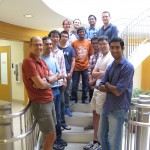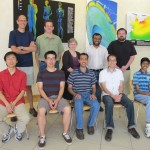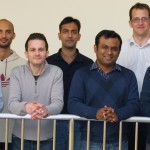The solutions to grand challenge problems in science and engineering require unprecedented computing power. Near future supercomputing platforms will rely on millions of possibly heterogeneous cores to deliver multi-petaflop performance. The design and deployment of algorithms that scale well on such platforms will be critical for exploiting the new architectures effectively. Nevertheless, few existing codes can scale to such large numbers of processors.
The mission of the Parallel Algorithms for Data Analysis and Simulation (PADAS) group is to integrate applied mathematics and computer science to design and deploy algorithms for grand challenge problems that scale to the largest supercomputing platforms. The group has developed high performance computing technologies for integral equations, fast multipole methods, multigrid solvers, octree data structures, fast solvers for inverse problems, and computational statistics algorithms.
The core application areas are in life sciences. The PADAS group is developing algorithms for:
- simulation of complex biological fluids, in particular the microcirculation of blood flow
- analysis of medical images
- biophysics-based image registration
- cardiovascular and soft tissue mechanics
- data assimilation for primary tumors



